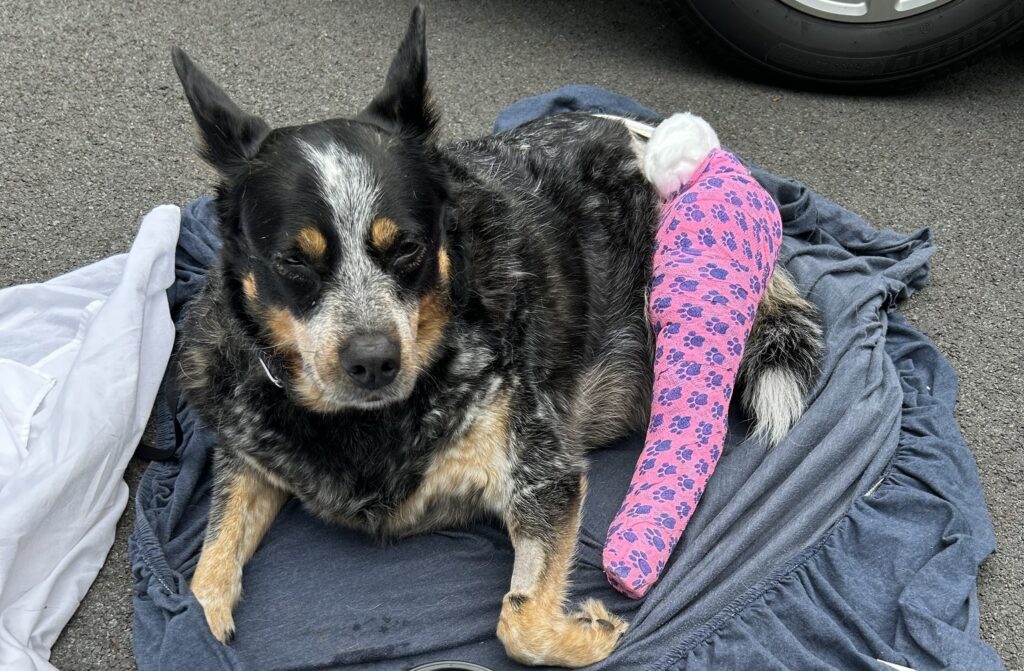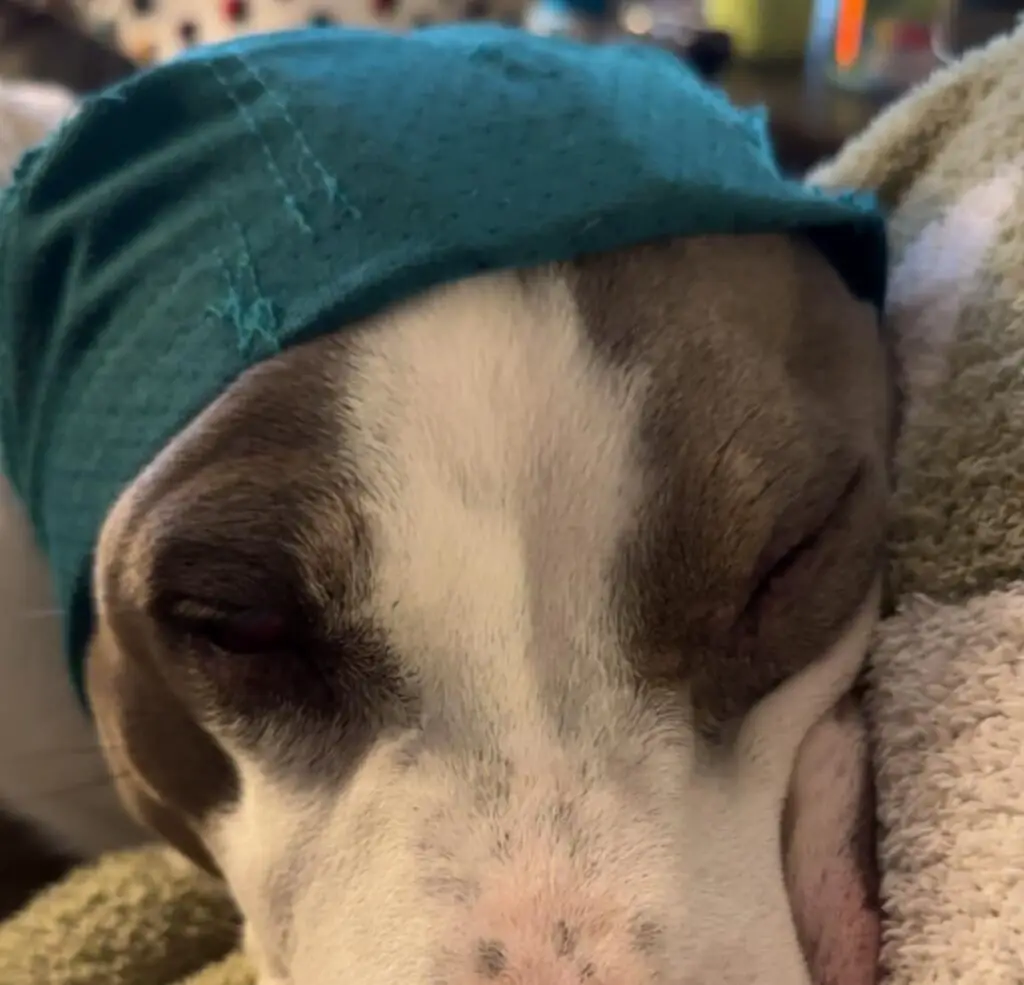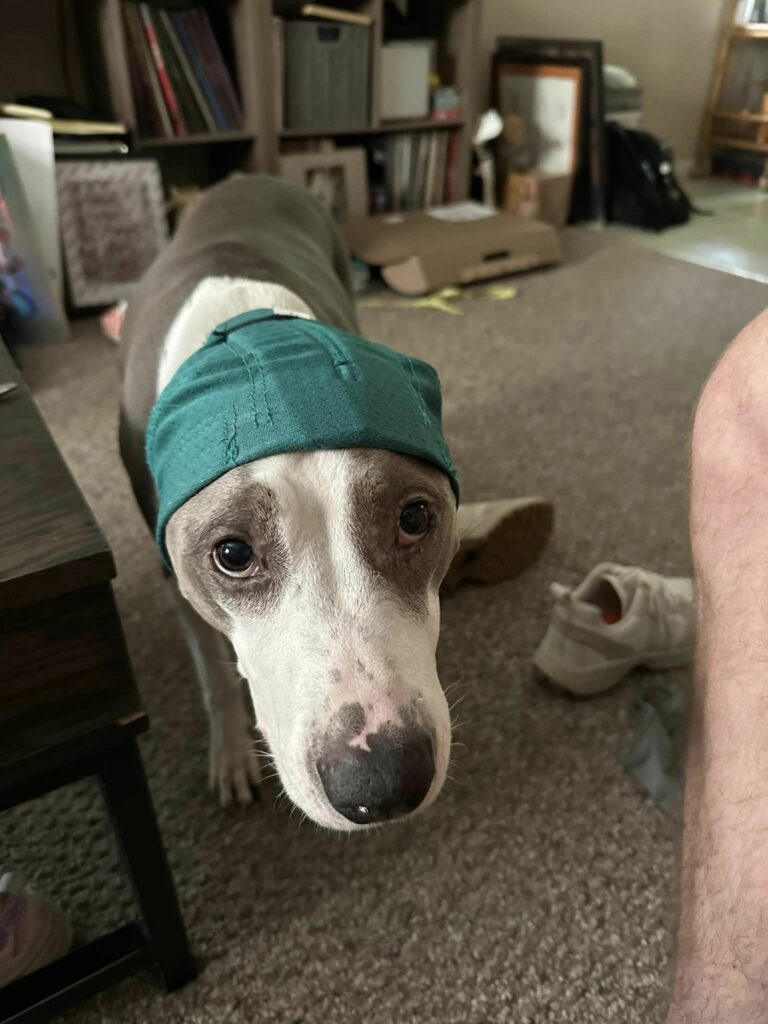Canine lymph nodes can swell after surgery, just like in humans. In this post, we will discuss the causes and symptoms of swollen lymph nodes in dogs.
We’ll also look at how to diagnose and treat this condition so that your pet can have a speedy recovery.
- Key Takeaway
- What Are Swollen Lymph Nodes in Dogs?
- Can Dogs Lymph Nodes Swell After Surgery?
- What Do Swollen Lymph Nodes Look Like On Dogs?
- What Causes Lymph Nodes To Swell In Dogs After Surgery?
- Symptoms of Lymph Node Swelling In Dogs Post-surgery
- How Long Does It Take For a Dog’s Swollen Lymph Nodes To Subside After Surgery?
- How To Care For a Dog With Swollen Lymph Nodes After Surgery
- When To Seek Veterinary Help
- FAQs
- Q: What are the symptoms of swollen lymph nodes in dogs?
- Q: How are swollen lymph nodes diagnosed in dogs?
- Q: Can swollen lymph nodes in dogs be a sign of lymphoma?
- Q: What are the common causes of swollen lymph nodes in dogs?
- Q: Where are the lymph nodes located in dogs?
- Q: What are the treatment options for swollen lymph nodes in dogs?
- Q: What is the prognosis for dogs with swollen lymph nodes?
- Q: What are the causes of lymph node enlargement in dogs?
- Q: What is the function of the lymphatic system in dogs?
- In Conclusion
Key Takeaway
- Swollen lymph nodes in dogs are enlarged glands that can be a sign of infection, inflammation, or disease, including cancer, within the body.
- Dog’s lymph nodes can swell after surgery due to reasons such as infection, inflammation, lymphedema, or even a recurrence of cancer.
- Swollen lymph nodes in dogs typically appear as noticeable lumps or bumps under the skin, often found in areas such as the neck, armpits, groin, or behind the knees.
What Are Swollen Lymph Nodes in Dogs?
Swollen lymph nodes in dogs, also known as lymphadenopathy or lymphadenomegaly, occur due to underlying diseases or infections. The swelling can affect one or multiple lymph nodes.
It’s important to note that not all instances of swollen lymph nodes indicate cancer, as they can also result from infections or autoimmune diseases.
See also: Ventral Superficial Cervical Lymph Nodes In Dogs
Can Dogs Lymph Nodes Swell After Surgery?

Yes, a dog’s lymph nodes can swell after surgery and this condition is known as lymphedema, which can occur any time after surgery or radiation to the lymph nodes.
The risk of lymphedema continues for the rest of the dog’s life and it can’t be cured, but it can be managed.
Any swelling should be checked by a healthcare provider right away.
It’s important to note that there are several possible causes of enlarged lymph nodes:
- , including bacterial, tick-borne, fungal, and parasitic infections.
Additionally, injuries, tumors, or underlying diseases can also cause the lymph nodes to swell.
If you notice a lump or swelling in your dog’s lymph nodes, it’s recommended to have it examined by a veterinarian immediately.
See also: Medial Iliac Lymph Nodes In Dogs: Causes, Symptoms, and Treatment
What Do Swollen Lymph Nodes Look Like On Dogs?

Swollen lymph nodes in dogs can be identified as firm, enlarged lumps that are non-painful.
These lumps can be felt or seen under the skin, usually appearing round, uniform in shape, and semi-hard.
The lymph nodes are located in several areas such as under the jaw where it meets the neck (submandibular), at the front of the shoulders (pre-scapular), and in the “armpit” of the dog where the front legs meet the chest (axillary).
In a healthy dog, the lymph nodes should be small—comparable to the size of a pea in small dogs and a grape in large dogs.
If they are swollen due to conditions like infection, inflammation, or cancer, they will typically be much more prominent.
See also: What Is a Reactive Lymph Node In Dogs?
What Causes Lymph Nodes To Swell In Dogs After Surgery?

- Infection: Post-surgical infections are a common cause. Bacteria can infiltrate the surgical site and cause inflammation in local lymph nodes as the body tries to fight off the infection.
- Inflammation: Any surgical procedure can cause localized inflammation, which may result in swelling of nearby lymph nodes.
- Lymphedema: This is a specific type of swelling that can occur when lymph nodes are removed or damaged during surgery, leading to a blockage in the lymphatic system.
- Cancer recurrence or metastasis: If the initial surgery was performed to remove a cancerous mass, swollen lymph nodes might indicate a recurrence of the cancer, or that the cancer has spread to other parts of the body.
- Allergic reaction: In some cases, a dog may have an allergic reaction to sutures or other materials used during the surgery, which can cause lymph nodes to swell.
See also: Can Dogs Lymph Nodes Swell From Allergies?
Symptoms of Lymph Node Swelling In Dogs Post-surgery
- Noticeable Lumps: One of the most obvious signs is the presence of visible and palpable lumps under the skin. These lumps, which are actually swollen lymph nodes, can be found in various parts of the body such as the neck, armpit, groin, or behind the knees.
- Changes in Eating Habits: Dogs with swollen lymph nodes may show changes in their eating habits, such as loss of appetite.
- Lethargy: Dogs may appear lethargic or less active than usual due to discomfort or pain associated with swollen lymph nodes.
- Fever: As the body fights off infection or inflammation, dogs may develop a fever.
- Pain or Discomfort: While the swollen lymph nodes themselves may not cause pain, the underlying condition causing the swelling can lead to discomfort. Dogs may exhibit signs of pain such as whining, restlessness, or reluctance to move certain parts of their body.
- Unusual Behavior: Dogs may display unusual behaviors such as excessive licking or grooming of the area where the swollen lymph nodes are located.
How Long Does It Take For a Dog’s Swollen Lymph Nodes To Subside After Surgery?
The swelling may start to decrease within a few days to weeks once the underlying cause is addressed.
For instance, if the swelling is due to an infection that has been treated with antibiotics, the lymph nodes may start to return to their normal size once the infection is cleared.
If the swelling is caused by surgical trauma or inflammation, it could take up to six weeks for the swelling to fully subside.
However, in cases where the lymph nodes were removed or damaged during surgery, leading to lymphedema (a type of swelling due to blockage in the lymphatic system), the swelling might be persistent and require ongoing management.
See also: How To Check a Dog’s Lymph Nodes
How To Care For a Dog With Swollen Lymph Nodes After Surgery
Here is how to care for a dog with swollen lymph nodes after surgery:
Contact Your Vet
If you notice new swelling in your dog’s lymph nodes post-surgery, it is crucial to contact your vet immediately. They can provide the appropriate treatment based on the cause of the swelling.
Monitor Your Dog’s Symptoms
Keep a close eye on any changes in your dog’s behavior or physical health. Changes in eating habits, lethargy, fever, pain or discomfort, and unusual behaviors such as excessive licking or grooming of the area where the swollen lymph nodes are located may be signs of an underlying issue.
Administer Prescribed Treatments
If your dog’s swollen lymph nodes are due to an infection, your vet may prescribe antibiotics. For more severe cases, such as cancer, more aggressive treatments such as chemotherapy or radiation therapy may be recommended. Always follow your vet’s instructions carefully.
Maintain a Healthy Environment
Ensure your dog is in a clean, comfortable environment to minimize the risk of further infections. Regular grooming can also help to prevent skin irritations that could lead to swollen lymph nodes.
Manage Lymphedema
If your dog develops lymphedema (swelling due to blockage in the lymphatic system) after surgery, this will require ongoing management. Your vet can provide advice on how to manage this condition.
When To Seek Veterinary Help
It is crucial to seek veterinary help immediately if you notice new swelling in your dog’s lymph nodes after surgery.
Even mild enlargement could be a sign of an underlying issue that needs attention.
Significant enlargement, particularly if it’s affecting the lymph nodes inside the thorax and abdomen, should be treated as a cause for concern.
FAQs
Q: What are the symptoms of swollen lymph nodes in dogs?
A: The symptoms of swollen lymph nodes in dogs may include enlargement or lumps in the lymph nodes, fever, loss of appetite, weight loss, fatigue, and changes in behavior.
Q: How are swollen lymph nodes diagnosed in dogs?
A: Swollen lymph nodes in dogs are typically diagnosed through physical examination and palpation of the lymph nodes. Additional tests, such as blood work, imaging, or a biopsy, may be necessary to determine the underlying cause.
Q: Can swollen lymph nodes in dogs be a sign of lymphoma?
A: Yes, swollen lymph nodes can be a symptom of lymphoma. This is a type of cancer that affects the lymphatic system. However, swollen lymph nodes can also be caused by other conditions.
Q: What are the common causes of swollen lymph nodes in dogs?
A: The common causes of swollen lymph nodes in dogs can include infections, inflammation, immune system disorders, cancer, and certain medications.
Q: Where are the lymph nodes located in dogs?
A: Dogs have lymph nodes throughout their bodies, including in the neck, armpits, groin, and behind the knees. Some specific lymph nodes in dogs include the submandibular lymph nodes, which are located under the jaw.
Q: What are the treatment options for swollen lymph nodes in dogs?
A: The treatment options for swollen lymph nodes in dogs depend on the underlying cause. This may include medication to treat infections or inflammation, chemotherapy or radiation therapy for cancer, or surgery to remove affected lymph nodes.
Q: What is the prognosis for dogs with swollen lymph nodes?
A: The prognosis for dogs with swollen lymph nodes depends on the cause. In some cases, swollen lymph nodes can be easily treated and resolved. However, if the underlying cause is a serious condition like lymphoma, the prognosis may be more guarded.
Q: What are the causes of lymph node enlargement in dogs?
A: Lymph node enlargement in dogs can be caused by various factors, including infections, inflammation, immune system disorders, cancer, and certain medications.
Q: What is the function of the lymphatic system in dogs?
A: The lymphatic system in dogs plays a crucial role in maintaining a healthy immune system. It helps transport lymph fluid, which contains white blood cells and other immune cells, throughout the body, filtering and fighting off infections and foreign substances.
In Conclusion
In conclusion, it is important to be aware that dogs’ lymph nodes may swell after surgery due to the body fighting off bacteria and other foreign substances from the surgery site.
This swelling should not cause concern unless it lasts for more than two days or if the dog exhibits signs of pain or discomfort.





Leave a Reply